Danaë
In Greek mythology, Danaë (/ˈdæneɪ.iː/[1] or /ˈdeɪneɪ/[2]as personal name also /dəˈneɪ/;[3] Ancient Greek: Δανάη, Ancient Greek: [daˈna.ɛː], Modern: [ðaˈna.i]) was an Argive princess and mother of the hero Perseus by Zeus. She was credited with founding the city of Ardea in Latium during the Bronze Age.
| Danaë | |
|---|---|
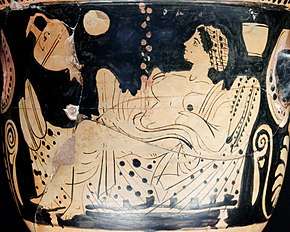 Ancient Boeotian bell-krater showing Zeus impregnating Danaë in the form of a shower of gold, circa 450-425 BC | |
| Personal information | |
| Parents | Acrisius and Eurydice |
| Consort | Zeus, Polydectes |
| Children | Perseus |
Family
Danae was the daughter and only child of King Acrisius of Argos by his wife Queen Eurydice[4] or Aganippe[5][6]. In some accounts, she had a sister, Evarete, wife of King Oenomaus of Pisa and mother of Hippodamia.[7]
Mythology
Disappointed by his lack of male heirs, King Acrisius asked the oracle of Delphi if this would change. The oracle announced to him that he would never have a son, but his daughter would, and that he would be killed by his daughter's son. At the time, Danae was childless and, meaning to keep her so, King Acrisius shut her up in a bronze chamber to be constructed under the court of his palace (other versions say she was imprisoned in a tall brass tower with a single richly adorned chamber, but with no doors or windows, just a sky-light as the source of light and air). She was buried in this tomb, never to see the light again. However, Zeus, the king of the gods, desired her, and came to her in the form of golden rain which streamed in through the roof of the subterranean chamber and down into her womb. Soon after, their child Perseus was born.
Unwilling to provoke the wrath of the gods or the Furies by killing his offspring and grandchild, King Acrisius cast Danaë and Perseus into the sea in a wooden chest. The sea was calmed by Poseidon and, at the request of Zeus, the pair survived. They were washed ashore on the island of Seriphos, where they were taken in by Dictys – the brother of King Polydectes – who raised Perseus to manhood. The King was charmed by Danaë, but she had no interest in him. Consequently, he agreed not to marry her only if her son would bring him the head of the Gorgon Medusa. Using Athena's shield, Hermes's winged sandals and Hades' helmet of invisibility, Perseus was able to evade Medusa's gaze and decapitate her.
Later, after Perseus brought back Medusa's head and rescued Andromeda, the oracle's prophecy came true. He started for Argos, but learning of the prophecy, instead went to Larissa, where athletic games were being held. By chance, an aging Acrisius was there and Perseus accidentally struck him on the head with his javelin (or discus), fulfilling the prophecy.
Genealogy
|
Gallery
- Danaë in art
- Jan Gossaert, 1527
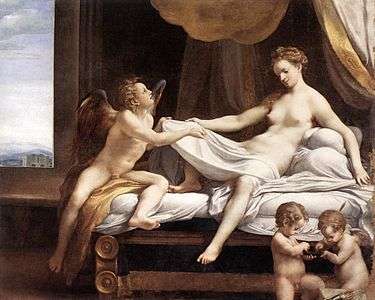 Correggio's Danaë, 1531–1532.
Correggio's Danaë, 1531–1532.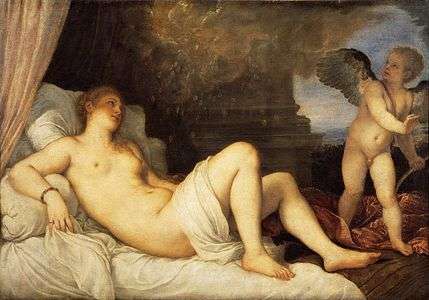 One of several variants by Titian, 1544. Cupid is alongside Danaë. 120 cm × 172 cm. National Museum of Capodimonte, Naples
One of several variants by Titian, 1544. Cupid is alongside Danaë. 120 cm × 172 cm. National Museum of Capodimonte, Naples Hendrick Goltzius, 1603
Hendrick Goltzius, 1603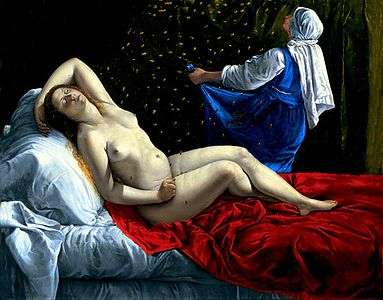 Artemisia Gentileschi, c. 1612
Artemisia Gentileschi, c. 1612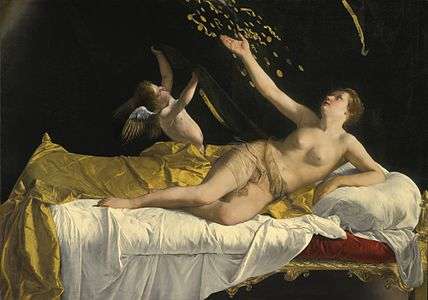 Danaë by Orazio Gentileschi, 1621–23.
Danaë by Orazio Gentileschi, 1621–23.
_-_Nationalmuseum_-_18771.tif.jpg) Danaë receiving Jupiter in a Shower of Gold, by Adolf Ulrik Wertmüller (1787)
Danaë receiving Jupiter in a Shower of Gold, by Adolf Ulrik Wertmüller (1787) Jacob van Loo, 1650s
Jacob van Loo, 1650s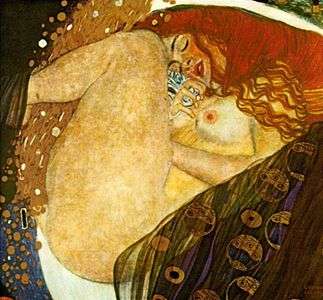 Gustav Klimt's Danaë, 1907.
Gustav Klimt's Danaë, 1907.
See also
- Danaë (disambiguation)#Art
- Pseudo-Apollodorus, Bibliotheke
- Danae-class cruiser
- The asteroid 61 Danaë, named after her
Notes
- Jones, Daniel; Roach, Peter, James Hartman and Jane Setter, eds. Cambridge English Pronouncing Dictionary. 17th edition. Cambridge UP, 2006.
- HMS Danae
- MTV Being Danae Dr Shifrin
- Pseudo-Apollodorus, Bibliotheca 2.2.2
- Hyginus, Fabulae 63
- Scholiast, ad Apollonius of Rhodes, Argonautica iv.1091
- Hyginus, Fabulae 84
References
- Gaius Julius Hyginus, Fabulae from The Myths of Hyginus translated and edited by Mary Grant. University of Kansas Publications in Humanistic Studies. Online version at the Topos Text Project.
- Pseudo-Apollodorus, The Library with an English Translation by Sir James George Frazer, F.B.A., F.R.S. in 2 Volumes, Cambridge, MA, Harvard University Press; London, William Heinemann Ltd. 1921. Online version at the Perseus Digital Library. Greek text available from the same website.
- Smith, William; Dictionary of Greek and Roman Biography and Mythology, London (1873). "Danae" , Acri'sius
External links
| Wikimedia Commons has media related to Danae. |
| Wikisource has the text of the 1911 Encyclopædia Britannica article Danae. |